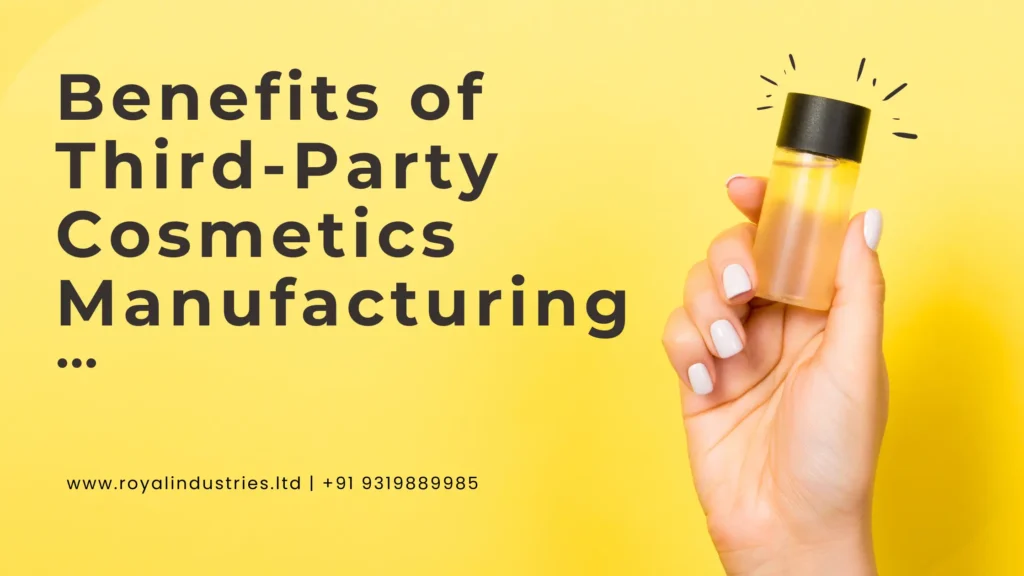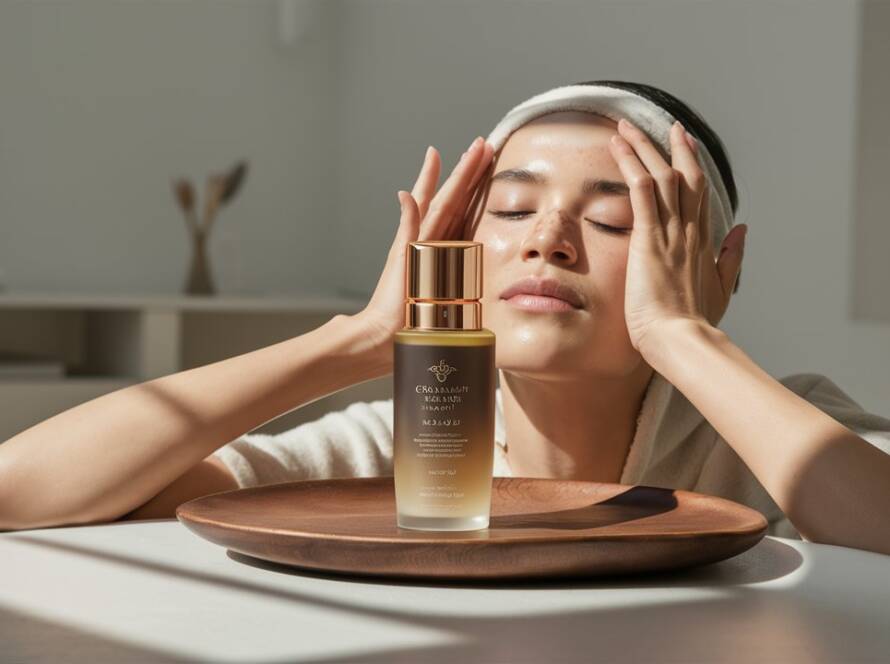
Everyone knows that men and women alike are increasingly reliant on beauty products. Everyone uses beauty products to look better and have more bright, shining skin. This increases market demand for beauty products. Many brands have entered the cosmetics market. Suppose you’re a beauty salon owner looking for trusted Indian third-party cosmetic manufacturing. No need to search further.
Even some famous actors and actresses have launched their beauty brands – focusing on cruelty and sustainable skincare! Your fantasy of a cosmetic brand can also become a reality; just stay with us till the end of the blog! You will learn what cosmetic third-party manufacturing is, the emerging latest trends, and the benefits of choosing the right manufacturer for your cosmetic products.
What is Cosmetic Third-Party Cosmetic Manufacturing?
Third-party Cosmetic manufacturing, also known as contract manufacturing, is a strategic business partnership wherein companies bring their brands to manufacture their cosmetic products. The companies involved in this practice are typically cosmetic third-party manufacturing companies. People of all ages and genders are using skincare and haircare products for better health due to increased awareness of their usefulness. Several cosmetic manufacturing companies are expanding across major Indian states due to rising demand.
Third-party Cosmetic Manufacturing Market Overview
The cosmetics industry is one of the fastest-growing in the world, increasing 20% annually. This vast market divides skincare into five basic categories: body, skin, hair, sun protection, and makeup removal. Cosmetic companies compete fiercely. Thus, marketing and advertising are important.
Manufacturing, which is the heart of this sector, requires expensive machinery and infrastructure that many aspiring entrepreneurs and cosmetic brand owners cannot afford.
Third-party cosmetics manufacturing involves outsourcing cosmetic product production to niche contract manufacturers for cosmetics. As customers worldwide prioritize self-care and well-being, the cosmetics sector continues to grow. After a slight hiccup in 2020 owing to the COVID-19 pandemic, the global cosmetics business has grown practically continuously since 2004 and was expected to reach approximately 129 billion U.S. dollars by 2028.
The Indian cosmetic sector is predicted to grow rapidly, as seen by the growing number of brands. Cosmetics firms like Nykaa and Purple understand this because an aggregator is listed on the Indian stock exchange.
The growing population, income, and internet have opened many doors for the cosmetic sector. Thus, longer-lasting, less sensitive products are needed. Cosmetic companies are investing in new technology and marketing methods rather than in-house production to accommodate this demand.
Technology makes online shopping easier. Thus, the Indian beauty sector is likely to grow faster than ever in the coming decades. This growth is attributed to several factors, including the growing desire for chemical-free herbal products. Cosmetic firms are investing in new technology and marketing tactics to meet this demand.
Why Choose Cosmetic Third-Party Manufacturing?
Cosmetic third-party manufacturing offers many advantages for companies looking to expand their product line or enter the market. By outsourcing manufacturing to recognized facilities, businesses can focus on branding, marketing, and distribution while leaving production to experts.
This cooperation streamlines operations, letting firms focus on their strengths while using Cosmetic Third-Party Manufacturing’s knowledge and infrastructure. Therefore, the collaborative strategy speeds up market entry and product extension, giving a competitive edge in the dynamic beauty business.
Cost-Effectiveness:
Cosmetic Third-party manufacturing saves organizations money by eliminating infrastructure and operational costs. Collaboration with established manufacturers unlocks cost efficiencies through shared resources and economies of scale without compromising product quality or regulatory compliance.
Specialisation and competence:
Cosmetic third-party manufacturing partners have extensive experience making beauty and personal care products. By using this experience, formulas meet strict criteria and meet changing consumer demands. Strategic alliances with experienced manufacturers provide organizations with industry insights on ingredient sourcing and market trends, improving product quality and competitiveness.
Adaptability and Scalability:
Cosmetic third-party manufacturing allows firms to adapt quickly to market changes and consumer expectations. Third-party manufacturers smoothly scale production to fit demand cycles without large capital investments or lengthy setup times. Businesses can grab growth and innovation opportunities thanks to trusted partners’ flexible manufacturing.
Quick and Easy:
Cosmetic third-party manufacturers save up time and resources for firms to focus on branding and market expansion. Manufacturing operations managed by experienced partners can speed up product development and market entry. This simplified strategy boosts efficiency and lets companies seize market opportunities quickly.
Minimizing Risk:
Cosmetic third-party manufacturing partners reduce production and distribution risks with strict quality control and regulatory compliance. Businesses protect brand identity and reduce product recalls and compliance issues by working with trusted manufacturers. Manufacturing partners ensure product safety and efficacy by following industry standards and quality assurance methods, boosting consumer confidence and reducing legal and reputational risks for businesses.
Third-Party Cosmetic Manufacturing Gaining Entry to Innovation:
Strategic partnerships with third-party cosmetics manufacturing leaders enable innovative formulations and packaging. To keep ahead of market trends, manufacturers spend on R&D, allowing them to use new skincare methods, sustainable ingredients, and eco-friendly packaging. Businesses distinguish their products and attract customers with appealing products that match changing preferences and values by leveraging manufacturing partners’ innovation.
Benefits of Third-Party Cosmetics Manufacturing

A good manufacturer possesses industry-specific skills and market knowledge. They understand industry trends, consumer preferences, and legal needs to ensure your products meet the highest standards and appeal to your target audience.
- Investing in cosmetic manufacturing machinery and infrastructure can be costly. Partnering with specialized contract manufacturing organizations (CMOs) lets you avoid these high early costs and focus on marketing, branding, and product development.
- They consistently produce high-quality cosmetics at volume. They have the infrastructure and capabilities to reliably satisfy your small batch or mass production needs.
- Established third-party manufacturers add credibility and experience to your brand. Their track record helps build consumer and retailer trust in your brand.
- Reliable third-party producers follow strict quality control standards and frequently hold industry certifications like GMP and ISO. Certificates ensure your items satisfy the highest quality requirements.
- Reputable & specialized contract manufacturing organizations (CMOs) are responsive and communicative, ensuring a seamless product development process.
- As your business expands, consider increasing manufacturing or introducing additional goods. Third-party cosmetics producers can adjust to your changing needs.
To meet the increased demand for environmentally sensitive cosmetics, third-party cosmetics manufacturers stress ethical and sustainable manufacturing techniques.
What Trends are Emerging in the Cosmetic Industry
Third-party cosmetic manufacturing track consumer preferences, market developments, and regulatory changes. Manufacturers can advise brands on product development and innovation by staying current on industry trends. Manufacturers shape beauty industry innovation by identifying new components, predicting trends, and overcoming regulatory issues.
Several cosmetic trends are emerging:
Online sales are rising. More people can buy cosmetics via e-commerce platforms. Quality products and industrial transparency are also in demand.
The use of natural cosmetic ingredients is another trend. Products now employ more organic ingredients and fewer harsh chemicals. Innovative and creative cosmetics formulae are also popular.
Beauty brands are collaborating with more and more influencers to expand their reach and make people aware of their brands. They are even connecting with actors and actresses!
Clean and natural skincare products are becoming more popular as consumers worry about the health and environmental effects of standard formulas. As clean beauty becomes increasingly popular, demand for safer, more sustainable products rises.
Technology and skin biology have led to more tailored skincare options. To establish a personalized regimen, these solutions consider skin type, issues, lifestyle, and surroundings.
With the help of Artificial intelligence (AI), machine learning and skin analysis devices, skin care manufacturing companies are using web and mobile apps to offer virtual consultations, skin quizzes, and personalized product recommendations based on user input and data analysis. New brands may stand out and give customers personalised skincare experiences by using AI, smart gadgets, and digital platforms.
Concerns about climate change, deforestation, and plastic pollution have increased demand for eco-friendly skincare products made with sustainably sourced ingredients, packaged in recyclable or biodegradable materials, and manufactured using environmentally friendly methods. Therefore, skincare businesses are under pressure to meet consumer demand for more sustainable and ecologically friendly products.
Consumers are increasingly buying skincare products online rather than in stores. Online shopping lets people browse a vast selection of skincare items, compare costs, read reviews, and buy from home. This trend has been hastened by e-commerce platforms, mobile technologies, and the COVID-19 pandemic, which drove many customers to shop online for skincare.
With increased awareness of skincare ingredients, consumers want product formulation transparency. Consumers want to know what ingredients are in their skincare products and how they may affect their skin and health.
How To Choose The Right Cosmetic Manufacturer
Partnering with a reliable third-party cosmetic manufacturer can help your cosmetic business succeed. In the competitive cosmetics sector, various things must be considered before choosing a manufacturer.
Here are some tips on how to choose the right cosmetic manufacturer:
1. Regulatory Compliance:
Find a company that follows FDA and EU regulations. They should be licensed, certified, and follow GMP to assure product safety and quality.
2. Third-Party Cosmetic Manufacturing Capabilities:
Make sure the manufacturer can meet your product needs. Consider their experience formulating skincare, makeup, haircare, and colour cosmetics. Check their equipment, technology, and production capability to match your needs.
3. Quality Control:
A good cosmetic producer should have strict quality controls. Ask about testing, raw material sourcing, and quality assurance. They should provide extensive paperwork and certifications.
4. Ingredient Sourcing:
Make sure the manufacturer can supply organic, natural, or ethically sourced ingredients. Check their ingredient suppliers’ sustainable and responsible sourcing policies.
5. Packaging Options:
Assess the manufacturer’s packaging options. They should provide packaging solutions, including custom packaging design, for your brand.
6. Manufacturer minimum order quantities (MOQs):
Consider whether they meet your business needs. Startups and small enterprises may struggle with high MOQs from manufacturers.
7. Lead Times:
Discuss manufacturer manufacturing and delivery lead times. To avoid product launch delays, make sure they can fulfil your deadlines and turnaround timeframes.
8. Pricing and Cost Structure:
Compare prices from multiple manufacturers to receive a competitive rate. Quality and compliance shouldn’t be sacrificed for pricing.
9. Communication and Customer Service:
Smooth working relationships require good communication and effective customer service. Evaluate the manufacturer’s communication channels, responsiveness, and readiness to answer questions.
10. References and repute:
Check the manufacturer’s industry repute. Ask for references from current clients and study internet reviews to assess their reliability and customer happiness.
Conclusion
As a cosmetic manufacturing unit, we at Royal Industries understand the evolving needs of the beauty industry and the demands of consumers for high-quality, innovative products. Our commitment to excellence in third-party cosmetic manufacturing ensures that brands can focus on their marketing and distribution strategies while we handle the production process with expertise and efficiency.
The rise of cosmetics has increased the demand for quality products and transparency. Consumers may now find what they want easier. The Indian cosmetic industry is competitive and depends on product innovation and market trends. The cosmetics industry is always changing due to consumer tastes, technology, and market developments.
New brands can succeed in this competitive market by following industry trends and using innovative techniques. New brands must adapt and develop to suit consumers’ changing expectations for clean beauty, individualized skincare, sustainability, and wellness. New skincare brands can succeed with a planned strategy and a commitment to excellence.
FAQs

What do you mean by third-party cosmetic manufacturing?
Third-party manufacturing lets cosmetic companies focus on marketing, distribution, and branding while specialists handle manufacturing. It saves firms time and money by removing the need to buy production machines and land, manage staff, and comply with laws and regulations.
Why is the demand for cosmetics increasing?
Beauty products are popular due to their health benefits. Cosmetics are in high demand due to beauty and health, cultural values, and consumer capitalism.
Which cosmetics are popular?
Anti-wrinkle, face, serum, and eye creams are popular. Hard water and pollution boost demand for such products. Pollution-induced collagen degradation causes wrinkles, and its effects on the skin are becoming more recognized.
What is the latest trend in beauty?
Many of beauty companies are shifting towards making sustainable, natural, clean and cruelty-free products. Over the previous five years, “sustainable skincare” searches have climbed 100%. Nearly one-third of beauty products are “clean” and expected to rise 12% by 2027.
Follow us on Instagram





